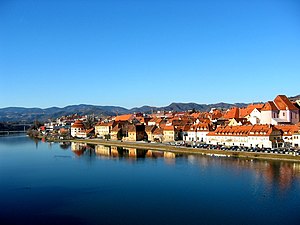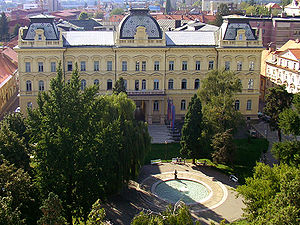From http://debate.uvm.edu/debateblog/better/Welcome.html, all details available here
Third international conference on argumentation, rhetoric, debate and the pedagogy of empowerment - thinking and speaking a better world
§ Department of Philosophy, Faculty of Arts, University of Maribor, Slovenia (Oddelek za filozofijo, Filozofska fakulteta, Univerza v Mariboru, Slovenija),
§ World Debate Institute (University of Vermont USA)
§ ZIP (Za in proti, zavod za kulturo dialoga/Pro et contra Institute for culture of dialogue Slovenia)
Friday, 22nd October 2010
13.00 – 14.30 Registration, Lobby
14.30 Welcome Remarks from hosts and organizers, Main Auditorium
Dr. Lučka Lorber, Vice - dean of Faculty of arts, University of Maribor - host
Boris Vezjak, University of Maribor - host
Alfred Snider, University of Vermont, USA - organizer
15.00 - 17.00
Argumentation, room 1, chair Boris Vezjak, University of Maribor, Slovenia
Public Argument and Debate
§ “Climategate”: Good Science, Bad Arguments, and Problems for Public Discourse, Steven Woods, Western Washington University, Bellingham, WA, USA and Misa Haring, Western Washington University, Bellingham, WA, USA
§ Argumentation in the Online Media Debate on the Blogs, Ivanka Mavrodieva, Sofia University, Bulgaria
§ Rhetoric of B. Obama, Natalija Kocijan
§ Latino National Identity and the 2006 English as the National Language Debate, Donathan L. Brown, Ithaca College, Ithaca, NY, USA
Debate, room 2, chair, Korry Harvey, Western Washington University, Bellingham, WA, USA
Debate and Social Progress
§ Debate as agency: Preparing students for civic engagement, Allan Louden, Wake Forest University, USA
§ Debate as a tool for social progress, Arlan A. Narvaez R., Universidad Central de Venezuela, Venezuela
§ The role of trust in political culture when teaching debate: The Kosovo case study, by Leela Koening, Netherlands and Maja Nenadović, University of Amsterdam, Netherlands
§ Challenges of on-line deliberation: the case of Citizen's forum, Simon Delakorda, & Matej Delakorda , Institute for Electronic Participation (InePA), Slovenia
Pedagogy, room 3, Sam Greenland, University of Sydney, Australia
Argument and Debate in Different Social and Cultural Contexts
§ Critical Thinking in Indian High schools – the TIC experiment, Ameya Kilara and Aditya Verma
§ Debating and argumentation skills in the speaking strand of Qatari National English and Arabic Curriculum Standards: A critical review, Abdul Gabbar Al – Sharif, Qatar Debate
§ The critical social and political thinking and the methods of educating students in secondary level education, Georgios D Bikos, University of Athens, Greece
§ Attending the process in philosophical discussion, Rudi Kotnik, University of Maribor, Slovenia
17.00 – 17.30 Coffee break
17.30 – 19.30
Panel discussion: Cultural Variation and Debate, Main Auditorium, chair Alfred Snider, University of Vermont
Invited: Abdul Gabbar Al – Sharif, Abdel Latiff Selami, Debbie Newman, Arlan A. Narvaez R., Masako Suzuki Takahashi, David WIlliams
Saturday, 23rd October 2010
9.30 – 11.00 Presentations
Argumentation, room 1, chair Steven Woods, Western Washington University, Bellingham, WA, USA
Processes of Rhetoric and Argumentation
§ Pain as rhetoric: Photographic depictions of suffering as an argumentative strategy, Taylor Hahn, Clarion University of Pennsylvania, U.S.A.
§ Aesthetic Public Deliberation, Michael Bruner, Georgia State Univ., USA
§ Motivational Consubstantiation as Starting Points for Arguments of Rhetorical Identification: A Burkean Approach, David Cratis Williams, Florida Atlantic University, Boca Raton, Florida, USA
Debate, room 2, chair Debbie Newman, UK
Explorations in Competitive Debating
§ Judging paradigms, Andrej Schulcz, Slovak Debate Association
§ Power pairing for Worlds Schools Debate Chamiponship, Alfred C Snider, University of Vermont
§ Assessing the role and use of international relations theory in competitive debate, Samo Novak, University of Leiden, Netherlands
Pedagogy, room 3, chair Sam Greenland, University of Sidney, Austalia
Active Methods in Different Learning Environments
§ Introducing a model for blending together traditional and modern teaching methodologies, George Yeoman, Slovenia/UK
§ Argumentative learning style of Arab learners of English as a second language, Abdel Latiff Selami, Qatar Debate, Qatar
§ Hosting competitive debates at the Faculty of arts in Ljubljana, Mirjana Želježič, University of Ljubljana, Slovenia
11.00 – 11.30 Coffee break
11.30 – 13.00 Keynote, Main Auditorium
Debbie Newman, The Noisy Classroom: Thinking aloud
13.00 – 14.00 Lunch
14.00 – 15.30 Presentations
Argumentation, room 1, chair: Michael Lane Bruner, Georgia State Univ., USA
Fallacies
§ Logical Fallacies = Rhetorical Fallacies?, Monika Kavalir, University of Ljubljana, Slovenia
§ Aristotle and »ad hominem« arguments, Boris Vezjak, University of Maribor, Slovenia
§ »Begging the question« in a philosophical argument - epistemic or pragmatic?, Danilo Šuster, University of Maribor, Slovenia
Debate, room 2, Allan Louden, Wake Forest University, USA
States of Debating in the USA
§ When classes collide – suburban and inner city debater, Chris Wheatly, Aspen Colorado Schools, USA
§ Failure in the public eye: The need for renewed engagement of the public sphere in academic debate communities within the United States, Taylor Hahn, Clarion University of Pennsylvannia, USA
§ Outcome based life choices: An outcome assessment comfirmation study measuring positive social outcomes beyond undergraduate experiences for participants and society in competitive intercollegiate debate, Jack E. Rogers, Department of communication, University of Central Missouri and Arthur Rennels, Interim Director of Forensics, University of Central Missouri, USA
Pedagogy, room 3, chair David Williams
New Approaches to Active Education
§ Critical understanding as an issue of problem solving in mathematics and physics education, Patronis Tasos, University of Patras and Rousiakis George, Greece
§ Numerical thinking, Simon Belak, University of Ljubljana, Slovenia
§ Theory of knowledge versus debate – parallel universes or two sides of the same coin, Matus Kurian, Gymnazium Jura Hronca/Slovak Debate Association, Slovakia
15.30 – 16.00 Coffee break
16.00 – 17.30. Sam Greenland, Keynote, Main Auditorium
18.00 – 19.30 Presentations
Debate, room 1, chair Samo Novak, University of Leiden, Netherlands
Active Learning About Communities and Minorities
§ Debate as a praxis for global citizenship, Anja Šerc, University of Ljubljana, Slovenia and Alfred C Snider, University of Vermont, USA
§ An approach to analysis on discourse toward minority, Masako Suzuki Takahashi, Research Center for Foreign Language Education, Keio University, Japan
Debate, room 2, chair George Yeoman, UK/Slovenia
Encounter Society Through Debate
§ Youth understanding politics – how youth initiatives can create an impact in society with debate, Monika Sobočan, University of Maribor
§ Why do people start debating? Helena Felc, Slovenia
§ Debate as a tool response for Venezuelan situation, Alejandro Duque, Universidad Central de Venezuela
Pedagogy, room 3, chair Anja Šerc, University of Ljubljana, Slovenia/Za in proti, zavod za kulturo dialoga, Slovenia
Designing and Implementing Debating in Schools
§ Secondary schools debates with visiting experts or how to implement debate in the interdisciplinary approach of curriculum and empower youth for active citizenship, Romana Čemažar, Gimnazija ESIC Kranj, Slovenia
§ Culture of debate in High school Domžale, Sofija Baskarad, Srednja šola Domžale, Slovenija
§ Tayloring debate formats for your specific educational goals, Manuele de Conti, University of Padua, Italy
20.00 BANQUET
Sunday, 24th October
10.00 – 11.30 Presentations
Argumentation, room 1, chair David Cratis Williams, Florida Atlantic University, Boca Raton, Florida, USA
Critical Thinking and Debate
§ Reason in the Balance: Teaching Critical Thinking as Inquiry, Sharon Bailin, Simon Fraser University, Vancouver, Canada and Mark Battersby, Capilano University, Vancouver, Canada
§ Rhetoric, oratory and philosophy in the debate, Cattani Adelino, Padua, Italy
Debate, room 2, chair Bojana Skrt, Za in proti, zavod za kulturo dialoga Slovenia
Debating Scenarios on Three Continents: Europe, East Africa and Japan
§ The transfer from debater to coach – how experienced debaters can contribute to the quality of high school debate education, Monika Sobočan, University of Maribor, Slovenia
§ Debate for Youth Empowerment in East Africa, Takako Mino, Claremont McKenna College, USA
§ Debate in Japan, Andrew Nishizaki, Japan
Pedagogy, room 3, chair Masako Suzuki Takahashi, Research Center for Foreign Language Education, Keio University, Japan
Using Debate in the Classroom
§ Teaching rhetoric at continuining education courses, Boštjan Debelak, Ljudska univerza Koper, Slovenia
§ Instructional Communication as a rhetorical process: political speech as a model of persuasion to be taught and studied, Irina Antonova, Russian State University for the Humanities, Moscow, Russia
§ Active methods and debate in a classroom, Karlina Koželj, High school for tourism Celje, Slovenia
§ Debate in the classroom, successful experience in Venezuela, Arlan A. Narvaez R., Universidad Central de Venezuela, Venezuela
11.30 – 12.00 Coffee break
12.00 – 13.30 Presentations
Argumentation, room 1, chair David Cratis Williams, Florida Atlantic University, USA
§ Philosophizing Without Argument, Nenad Miščević, Central University Budapest, Hungary
§ Level of Generality as a Rhetoric Device, Katarzyna Kobos, University of Lodz
Debate, room 2, chair Steven Woods, Western Washington University,Bellingham, WA, USA
Different Paths to Debate in the USA
§ National policy debate circuit in U.S.A, Chris Wheatly, Aspen, Colorado Schools, USA
§ Debate as transformative experience, Amanda Feller and Kelly Ryan, Pacific Luthern University,
§ Negotiating expertise: Translating debate techne into community practice, Jeff Kurr and John Ried, University of Pittsburgh
Pedagogy, room 3, Allan Louden, Wake Forest University, USA
Training Citizens and Training Debaters
§ An argumentation and debate text book for not debaters: Understanding Argument: the journey from consumer to critic, critic to advocate, Korry Harvey and Paul Bingham, Western Washington University, USA
§ Training model: Debate academy, Alfred C Snider, University of Vermont, USA and Bojana Skrt, Slovenia
13.30 Closing, Main Auditorium











![Reblog this post [with Zemanta]](http://img.zemanta.com/reblog_e.png?x-id=6d741c18-1c0f-4ef0-90bd-1fcbdf54a14a)




![Reblog this post [with Zemanta]](http://img.zemanta.com/reblog_e.png?x-id=623af3fd-624d-46eb-a588-cca005226deb)

![Reblog this post [with Zemanta]](http://img.zemanta.com/reblog_e.png?x-id=06eb2a97-b250-4d7f-898d-2c97f08199e1)